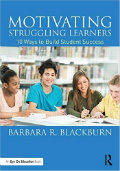The 6 Characteristics of Effective Praise

Most teachers regularly use praise in their classrooms. However, students can interpret praise positively or negatively. Let’s look at six characteristics of effective praise, using a simple acronym:
| Effective PRAISE
Positive Reinforces High Expectations Appropriate Independence Is Promoted Sincere Effort and Progress Are Noted |
Praise Is Positive

You may think sarcasm is an effective tool to use, particularly with older students. I respectfully disagree. My experience is that, although students won’t show it, deep down sarcasm reinforces any negative comments they’ve heard in the past. Again, too often, they experience enough sarcasm at home and from their peers. They need us to be encouraging and appreciative.
Praise Reinforces High Expectations
Next, praise should reinforce your high expectations. Notice I said HIGH expectations. If we praise something that is too easy for students, we can actually undermine their confidence. For example, let’s say we give students less rigorous work so they can “finish it easily and build their confidence,” and then praise them for that work.
It’s a strategy sure to backfire. They recognize they didn’t do the same level of work as their classmates, and when we praise them, they understand that we are just trying to make them “feel better.” In that case, rather than encouraging them, we are actually sending them the message that they aren’t “good enough” to do the real work, and it undermines their confidence.
Praise Is Appropriate
Praise should also be appropriate. This encompasses several specific behaviors we should use. First, praise may be public or private. Sometimes students don’t want to be recognized in front of other students. Choose whatever best fits your students’ needs.
Next, praise may come in different forms. Sometimes you can praise students verbally, and other times you may want to use written praise. Written praise is particularly effective, as many students will share your words with their families or keep them to look at later.
Lastly, praise needs to focus on what students do, not who they are. If we praise students for being the sister of a particularly strong student, we aren’t encouraging growth, we are simply acknowledging the older sibling. Be sure you are praising students for the quality of their work, or their effort, rather than their looks, their family connections, or their personality.
Praise Promotes Independence
Next, praise should promote independence. If we aren’t careful, students can become so attached to our praise that they can’t be satisfied to simply do something well for the sake of it. We don’t want them to be more dependent on us; we want them to be less so.
This means that as part of our praise, we should ask questions of our students. For example: “How do you feel about your work?” Then we can agree with their positive comments. Or, “I notice you are very successful with that assignment. What did you do?” and then praise those steps. Questions such as these encourage self-reflection and focus on the student’s feelings rather than our own.
Praise Is Sincere

Sincere praise comes from the heart. You mean it. It’s authentic. And that comes through to students. It’s also based in reality; it’s not imagined. With sincere praise, you are identifying something specific the student has done or is doing, and that’s what you praise.
Whether you are praising a successful action, or their effort, students know and appreciate the reality of the praise. When that happens, praise is meaningful to students.
Praise Notes Effort and Progress
Finally, effective praise focuses on effort and progress rather than ability. Carol Dweck, in her book Mindset, provides research that supports this concept. She found that if students are praised for their ability (“you’re so smart”), over time their effort and achievement decreases. But, if students are praised for their effort (“I can tell you tried hard and successfully read the paragraph”), over time their effort increases, as does their achievement. That’s why it’s important to consider how we phrase our praise.
When my stepson was in the sixth grade, he struggled with math. My husband was always telling him how smart he was, and that he could be successful. Then, one day, my husband heard me speak on this topic. He changed how he talked with Hunter, encouraging his efforts to learn the material. By the end of the year, Hunter was quite successful and scored above average on the achievement test.
Praise can be a great motivator
Praise can be an effective tool to encourage students and to motivate them to continue to learn. However, we must use appropriate praise in order to accomplish this. By being positive, appropriate, and sincere, reinforcing high expectations, promoting independence, and noting effort and progress, we can help our students thrive.
































I love this. It is so helpful to provide teachers and parents with concrete ways for how to praise. Our language and tone matter!
I agree with the praise being appropriate and only if deserved. Too many times students get praised for merely doing what is expected and that encourages a society of needy people needing their hand held for everything they do. Praise should certainly only be when the rigor expected is high. I was very happy that the article expressed this.
Terrific synopsis of effective praise! We need to remember that feedback can also come from asking questions and being genuinely interested in students’ answers.
I love this and I agree that effective praise must be sincere and not fake, or it won’t be taken serious at all. Have to remember that these are human beings with real feelings.